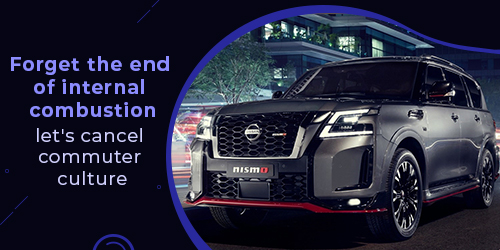If that is true, EV Adoption is nothing but a burden to the poor, even aggressive subsidies do not help those who cannot afford new cars.
2020 saw the largest carbon emissions in record history. Is it the result of aggressive EV discounts or market-based correction? Did the corrupt communist regime remove the God-given transfers from our roots? No, the cars went nowhere; Made tours.
By 2019, the average American will spend an hour in the office. It’s more than nine days a year – and most Americans are on vacation and by 2020, we’ve proven that it shouldn’t be.
It is bad for our health, bad for our wallets, bad for our roads and bad for the environment. Reducing the number of trips required should not be the product of a dire situation; this is the primary focus of US emissions policy.

We all succeed in a world where some people are forced to travel. The air is clean; the roads are short and on average hundreds thousands, and in some cases productivity and research time are lost each year. In addition, when talking about selfishness, we can eliminate the necessary trips; there will be more space for those who want to enjoy the open road. The charge office manager, 26, is now 70 or 64 or working from home.
There is nothing wrong with obstructing travel. But there is an obvious problem: there is no one to complain to. Do cars get dirtier? Are control cars too expensive? Criticize the government. Is the price of OPEC oil too high?
All of these are “consistent” in three short words. Can we grasp the need to end the travel culture? “Stop doing this” is the best I can bring and it is not available to us anywhere. “Take public transportation!”

But we have to figure it out, because electric cars are not magic bullets. Although their adoption is “when” rather than “when”, there is no immediate time for “when”. Leaving aside issues such as accessing and charging real-world energy resources, the electric car economy is not yet sufficiently developed to function sustainably. There is almost no secondary market, and generations lag decades behind the latest EV technology.
If that is true, EV Adoption is nothing but a burden to the poor, even aggressive subsidies do not help those who cannot afford new cars. Also, how many times can we use it to escape the consumer crisis before our numbers arrive?
If you really hope to lead the automotive industry with pure technology, you are disappointing yourself. If it weren’t for the university research team that stumbled upon one of the most important corporate divisions in the last two decades, Volkswagen would still be producing counterfeit diesel.
No obvious scams over time, no change in preferences and messages. Even a year ago, FCA officials were still leaning towards the idea that pickup buyers did not need batteries. As the days of the Trump administration get longer, there is a significant change in tone. Electrification is now the future of Stellantis.
This is the future of the automotive industry – the inevitable delay. Many will try and some of them will succeed. How long? It is almost impossible to tell. OEM and government officials alike have tried to remotely and easily grasp the time limit using good, circular statistics.
It solves all the problems we face in accepting electric vehicles at night, but if we do not take steps to reduce travel it will be like most cars on the road. We can emit less pollution, but we expend energy that is nowhere to be found and we are still miserable in doing so. The goal of all power is classic – necessary but to keep the whole problem at the feet of the automotive industry, it is a recipe for long and fascinating problems with constant and constantly changing timelines by those in control.
Last year we made a mistake on the initial, most important stages of achieving a stable balance. It is wise to do nothing about the growing pain. First you can protect people from trips they don’t want to make, and then remove some bad ideas from the air most importantly take that travel time yourself.
